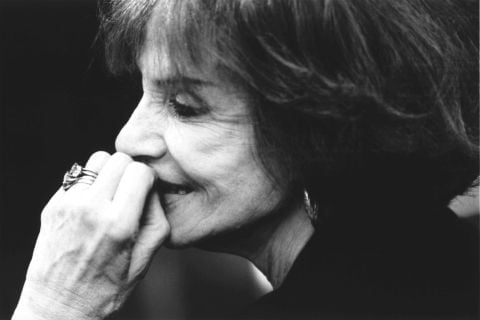
Vénus Khoury-Ghata
- Lebanon
- Zu Gast beim ilb: 2005
Vénus Khoury-Ghata was born in Bcharré in northern Lebanon in 1937. She grew up with three siblings in a Christian quarter of Beirut. Her mother tongue is Arabic, whereas her father preferred the French culture and language. Thus, her first attempts at writing were »in French from left to right on the page and in Arabic from right to left«, with the text meeting in the middle, as she puts it, »in a forbidden, incestuous marriage«. Although she eventually chose the French language, Arabic rhythms and tropes subsist in Khoury-Ghata’s work. They experience some kind of homecoming through translation. »My poems, which I write in French, return to their mother tongue whenever they are translated into Arabic. They sound as if they were orginally written in Arabic.« Shortly after the publication of her first poem Khoury-Ghata was elected »Miss Lebanon« and soon afterwards married a respected Muslim, with whom she has three children. Over the years she devoted more and more time to writing. Before the outbreak of the civil war in Lebanon, she followed her second husband, a Frenchman, to Paris.
To date Khoury-Ghata has published over twenty-five volumes of poetry and novels. Works by her translated into German include: »Les fiancées du cap Ténès« (1996; Engl: The Fiancés of Cap Ténès), »Bayarmine« (1987), and »La maîtresse du notable« (1991; Engl: The Mistress of the Dignitary), for which she received the German LiBeratur Prize. This novel tells the story of the resident of a house lying on the demarcation line between the Christian and Muslim quarters of a Lebanese city after the end of the civil war. A large conflict is sparked off after the main character breaks away from her restricting circumstances and crosses the border in order to be with the Muslim dignitary who is her lover. Subsequently, the abandoned household sinks ever more into desolation. Khoury-Ghata describes the experience of hopelessness and loss in a sometimes ironic or even cynical and almost ruthless sounding way, but always clearly. These themes also provide the central motifs for her poems: expressive and gloomy tableaux of a surreal estrangement evoking a multiplicity of interpretations.
Khoury-Ghata has received numerous prizes, among them the Prix Mallarmé for »Monologue du mort« (1986; Engl: Monologue of the Dead), the Prix des Gens des Lettres for »Fables pour un peuple d’argile« (1992; Engl: Fables for a People of Clay), and the Prix Baie des Anges for »Le Moine, l’Ottoman et la femme du grand argentier« (2003; Engl: The Monk, the Ottoman and the Finance Minister’s Wife). In 2000 she was named a Chevalier de la Légion d’Honneur. She serves on the jury of various literary prize committees and also works for radio and newspapers. Khoury-Ghata lives in Paris.
© international literature festival berlin
Le fils empaillé
Belfond
Paris, 1980
Les morts n’avaient pas d’ombre
Flammarion
Paris, 1984
Monologue du mort
Belfond
Paris, 1986
Mortemaison
Flammarion
Paris, 1986
Les fugues d’Olympia
Ramsay
Paris, 1989
Bayarmine
Fischer
Frankfurt/Main, 1990
Übersetzung: Widulind Clerc-Erle
Fables pour un peuple d´argile
Belfond
Paris, 1992
Die Geliebte des Notablen
Horlemann
Unkel/ Rhein, 1994
Übersetzung: Sigrid Köppen
Anthologie personelle
Actes Sud
Arles, 1997
Die Verlobten vom Kap Ténès
Artemis & Winkler
Düsseldorf, Zürich, 1998
Übersetzung: Sigrid Köppen
Elle dit
Balland
Paris, 1999
Le Moine, l´Ottoman et la femme du grand argentier
Actes Sud
Arles, 2003
Quelle est la nuit parmi les nuits
Mercure de France
Paris, 2004
La maison aux orties
Actes Sud
Arles, 2006
Übersetzer: Wildulind Clerc-Erle, Sigrid Köppen, Stefan Weidner
